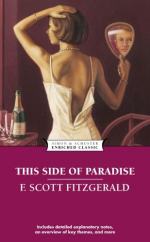|
This section contains 1,758 words (approx. 5 pages at 400 words per page) |

|
Generational Conflict
Although Fitzgerald's novel may seem less shocking now, it created a sensation when it was published because of its representation of a younger generation that perceived itself as departing entirely from the tradition of the generations before it. Amory's vanity and egotism, his flirtatious affairs with young women, his startling ideas (such as about socialism), and his vague contempt for nineteenth-century tradition all struck a chord with a generation that blamed their parents, for example, for the horrors of World War I.
This generational conflict was a key motivation for the modernist literary movement in the United States. In This Side of Paradise, the intellectual and aesthetic aspects of the conflict are first revealed by Burne Holiday, who inspires many of Amory's own convictions against nineteenth-century tradition. And Amory's meditations and convictions in "The Egotist Becomes a Personage," although many critics have noted that they are not...
|
This section contains 1,758 words (approx. 5 pages at 400 words per page) |

|




